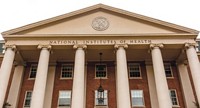Advertisement
Grab your lab coat. Let's get started
Welcome!
Welcome!
Create an account below to get 6 C&EN articles per month, receive newsletters and more - all free.
It seems this is your first time logging in online. Please enter the following information to continue.
As an ACS member you automatically get access to this site. All we need is few more details to create your reading experience.
Not you? Sign in with a different account.
Not you? Sign in with a different account.
ERROR 1
ERROR 1
ERROR 2
ERROR 2
ERROR 2
ERROR 2
ERROR 2
Password and Confirm password must match.
If you have an ACS member number, please enter it here so we can link this account to your membership. (optional)
ERROR 2
ACS values your privacy. By submitting your information, you are gaining access to C&EN and subscribing to our weekly newsletter. We use the information you provide to make your reading experience better, and we will never sell your data to third party members.
Policy
Science community works to stem sexual harassment
U.S. NIH, NSF, and AAAS announce new policies dealing with harassers
by Andrea Widener
September 23, 2018
| A version of this story appeared in
Volume 96, Issue 38
As the scientific community grapples with the #MeToo movement, U.S. science agencies and societies are announcing new policies aimed at identifying and punishing harassers.
On Sept. 19, NSF unveiled the final version of policies proposed in February that require universities to report any confirmed cases of harassment, as well as principal investigators who have been placed on administrative leave or given another disciplinary action.
The goal of the policies is to ensure that the research and learning environments NSF supports are free from harassment. “Those subjected to harassment are members of the scientific community,” NSF Director France Córdova says.
Responding to almost 200 comments on the February proposal, NSF’s final version adds definitions of harassment terminology and clarifies exactly what will happen when a complaint is reported to the agency.
The policy goes into effect Oct. 21. But NSF has already received a half-dozen voluntary notifications from universities, as well as more than 10 complaints from people in the community, the agency says.
NIH also unveiled new sexual harassment policies on Sept. 17, though changes are aimed at its scientist and staff employees rather than grantees. “We wanted to tighten up the system here,” NIH Director Francis Collins says.
The changes include funneling harassment complaints to a single investigative office, revamping harassment training, and clarifying that managers must report any harassment complaints. NIH also plans to administer a comprehensive survey to all of its staff.
Policies for grantees remain the same, though Collins says he wants university leaders to understand that he takes harassment seriously. “Unless we have the full engagement of the scientific leadership, the culture will be hard to change.”
Both NSF and NIH have new websites designed to make it easier to understand their harassment policies and report harassment, www.nsf.gov/harassment and www.nih.gov/anti-sexual-harassment.
Meanwhile, the American Association for the Advancement of Science (AAAS) announced changes that would allow the organization to revoke the designation of AAAS Fellow from scientists for misconduct or breaches of scientific ethics. AAAS specifically cites sexual harassment as one of the reasons that a fellow’s status could be revoked.



Join the conversation
Contact the reporter
Submit a Letter to the Editor for publication
Engage with us on Twitter